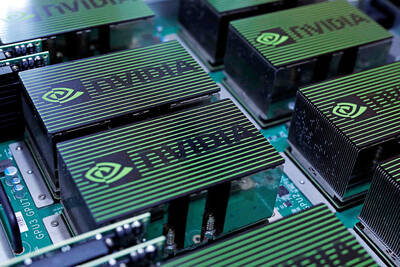Vacancy rates for grade-A offices in Taipei dropped to 4.4 percent last quarter, even though take-up rates dipped, as stable leasing demand and a lack of new supply encouraged tenants to stay put, Jones Lang LaSalle Inc (JLL) said on Tuesday.
That was 1 percentage point lower compared with three months earlier, while average monthly rents rose to a 18-year high of NT$2,753 (US$89.25) per ping (3.3m2), due to resilient demand from companies in the technology, financial and Internet sectors, JLL associate market director Brian Liu (劉建宇) told a media briefing.
Take-up rates totaled 7,638 ping, a decrease of 600 ping from the previous quarter, but were still comfortably above the 10-year average of 6,000 ping, the broker’s report showed.
“Leasing demand may cool down a bit this year as companies turn cautious about expansion amid an ongoing economic slowdown at home and abroad,” Liu said.
However, landlords have on the whole managed to retain tenants by offering grace periods and other incentives, he said.
A lack of new supply in the next three years could push vacancy rates to a record low of 3 percent by the end of this year and raise rents by 3 percent, Liu said, adding that new office buildings are almost fully occupied, lending support to this.
Vacancy rates in Taipei’s Xinyi District (信義) tapered to 3.9 percent last quarter with office rents picking up 1.7 percent to NT$3,316 per ping, the report showed.
Vacancy rates averaged 10.2 percent in Dunbei (敦北) and 7.1 percent in Dunnan (敦南), it said, adding that monthly rents for offices in both commercial areas held steady at NT$2,372 and NT$2,464 per ping respectively.
Office demand fared better in non-central business districts such as Neihu (內湖) and Nangang (南港), with vacancy rates of close to zero, it said.
A growing number of companies relocated to suburban districts, attracted by new facilities and more affordable rents, it said.
Monthly rents averaged NT$1,374 per ping in Neihu and NT$1,416 per ping in Nangang.
In related news, large-scale commercial property deals driven by hotel demand in Kaohsiung amounted to NT$14.71 billion last quarter, higher than the 10-year average of NT$12.1 billion, JLL said in a separate report.
HPW Co (海霸王企業), which runs restaurants, hotels and food logistics centers in Taiwan and China, last month won a foreclosure auction, paying NT$5.44 billion for several floors in Kaohsiung’s tallest building, 85 Sky Tower. The floors currently house two lodging facilities.

Leading Taiwanese bicycle brands Giant Manufacturing Co (巨大機械) and Merida Industry Co (美利達工業) on Sunday said that they have adopted measures to mitigate the impact of the tariff policies of US President Donald Trump’s administration. The US announced at the beginning of this month that it would impose a 20 percent tariff on imported goods made in Taiwan, effective on Thursday last week. The tariff would be added to other pre-existing most-favored-nation duties and industry-specific trade remedy levy, which would bring the overall tariff on Taiwan-made bicycles to between 25.5 percent and 31 percent. However, Giant did not seem too perturbed by the

AI SERVER DEMAND: ‘Overall industry demand continues to outpace supply and we are expanding capacity to meet it,’ the company’s chief executive officer said Hon Hai Precision Industry Co (鴻海精密) yesterday reported that net profit last quarter rose 27 percent from the same quarter last year on the back of demand for cloud services and high-performance computing products. Net profit surged to NT$44.36 billion (US$1.48 billion) from NT$35.04 billion a year earlier. On a quarterly basis, net profit grew 5 percent from NT$42.1 billion. Earnings per share expanded to NT$3.19 from NT$2.53 a year earlier and NT$3.03 in the first quarter. However, a sharp appreciation of the New Taiwan dollar since early May has weighed on the company’s performance, Hon Hai chief financial officer David Huang (黃德才)

NVIDIA FACTOR: Shipments of AI servers powered by GB300 chips would undergo pilot runs this quarter, with small shipments possibly starting next quarter, it said Quanta Computer Inc (廣達), which supplies artificial intelligence (AI) servers powered by Nvidia Corp chips, yesterday said that AI servers are on track to account for 70 percent of its total server revenue this year, thanks to improved yield rates and a better learning curve for Nvidia’s GB300 chip-based servers. AI servers accounted for more than 60 percent of its total server revenue in the first half of this year, Quanta chief financial officer Elton Yang (楊俊烈) told an online conference. The company’s latest production learning curve of the AI servers powered by Nvidia’s GB200 chips has improved after overcoming key component

UNPRECEDENTED DEAL: The arrangement which also includes AMD risks invalidating the national security rationale for US export controls, an expert said Nvidia Corp and Advanced Micro Devices Inc (AMD) have agreed to pay 15 percent of their revenue from Chinese artificial intelligence (AI) chip sales to the US government in a deal to secure export licenses, an unusual arrangement that might unnerve both US companies and Beijing. Nvidia plans to share 15 percent of the revenue from sales of its H20 AI accelerator in China, a person familiar with the matter said. AMD is to deliver the same share from MI308 revenue, the person added, asking for anonymity to discuss internal deliberations. The arrangement reflects US President Donald Trump’s consistent effort to engineer